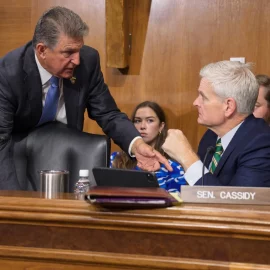
A House committee released legislation for revenue sharing.
For the first time in a decade, a U.S. House committee advanced legislation Thursday that would increase the federal offshore royalties that Louisiana and other oil-and gas-producing states receive. The revenue-sharing increase that Louisiana has been seeking since 2006 will be part of the bill that is the No. 1 priority for the House this term: The Lower Energy Cost Act, sponsored by House Majority Leader Steve Scalise, R-Jefferson. “I will be introducing our H.R. 1, the Lower Energy Costs Act, to cut red tape and increase energy production here at home to lower energy costs and stop our reliance on hostile foreign dictators for our energy and minerals,” Scalise said Thursday. The new bill is an amalgamation of a dozen or so energy-related measures that were heard and advanced out of House committees on Thursday. H.R. 1 will likely receive a vote by the full House by the end of the month. “This bill also includes the BREEZE Act that will increase the revenue our state receives from oil and gas exploration and production in the Gulf and create the framework to receive revenue from future offshore wind development,” Scalise said. “This will give Louisiana millions more to restore our coast and provide stronger flood protection for our communities.”
nola.com
The BREEZE Act gives us more money.
The Budgeting for Renewable Electrical Energy Zone Earnings Act, called BREEZE, would increase royalty payments to Louisiana and other producing states from 37.5% to 50% of the take and remove the cap that limited the amount of total money going from the federal treasury to the states. The BREEZE wording was inserted into the sweeping Transparency, Accountability, Permitting, and Production of American Resources Act, or the TAPP Act, which cleared the House Natural Resources Committee on a party-line 24-19 vote. The TAPP Act, H.R. 1335, is the largest of the energy-related bills advancing Thursday that address promises Republicans made during the November midterms to increase oil and gas production. All those bills are being merged into H.R. 1. “We’re here to let energy out of the box,” said Rep. Bruce Westerman, R-Hot Springs, Arkansas, the chair of the Natural Resources committee. The TAPP Act also includes provisions that would streamline – or gut, in critics’ view – procedures in the 53-year-old environmental protection law and thereby decrease the amount of time needed to complete highway and other projects that receive federal funds.
There is also a desire to shorten the review process.
U.S. Rep. Garret Graves, R-Baton Rouge, wrote a provision that would make environmental assessments required under the National Environmental Policy Act of 1970, called NEPA, take less time, be simpler to review, and be less exposed to lawsuits. He has said that past red tape and lawsuits have meant at least seven years of delays on major flood control and other projects. In addition to increasing the states’ portion of federal royalties and streamlining permitting reviews, the TAPP Act would immediately compel quarterly lease sales for energy exploration on federal lands and offshore; require an updated five-year plan for energy production; and roll back the fee increases on energy lease sales imposed during the Biden administration. The goal of the TAPP Act is to deliver projects quicker and resume new energy leasing and production in places such as the Gulf of Mexico, which would provide more funding for Louisiana’s hurricane protection, coastal restoration and flood control efforts. “This bill is going to allow us to not take five, six, seven years to build projects,” Graves said in a brief interview during a break in the committee hearing. “It’s going to reduce the cost associated with environmental compliance. And I would argue it’s actually going to force focus more on true environmental implications, and not all of these other ancillary non-environmental things that have gotten baked in over decades.” Democrats disagree.
These provisions give into industry.
Industry has tried to chip away at NEPA since 1970, said U.S. Rep. Raúl Grijalva, the Tucson Democrat who had chaired the committee and now serves as the panel’s minority leader since the GOP took over the U.S. House in January. “If I was to have an animal metaphor, it would be that H.R. 1335 is akin to inviting the fox into the hen house in terms of what is at stake here with climate change, environment and issues of health,” Grijalva said. The TAPP Act sets minimum quotas for oil and gas leases, even if there’s no interest in those sales, he said. A rollback of the environmental assessments required in the NEPA law is something industry has wanted for 53 years. “The environmental review and public input process required by NEPA are some of the most important guardrails we have for making major carbon polluters like oil and gas refineries safer, cleaner and more accountable to nearby communities and our climate goals at large,” Grijalva said.
The battle is ideology. One side wants protections the other wants oil.
At issue is how best to transition from fossil fuels to the less polluting, renewable sources of energy. The Biden administration has been financially supporting the development of green energy as an answer towards global warming. But oil, natural gas and coal provides the nation with 83% of the energy used, not to mention thousands of jobs. “This is really a battle of ideology here,” Graves said.
The sad part is that if the republicans wanted to work with the democrats both sides could win. But this is an all or nothing war.

